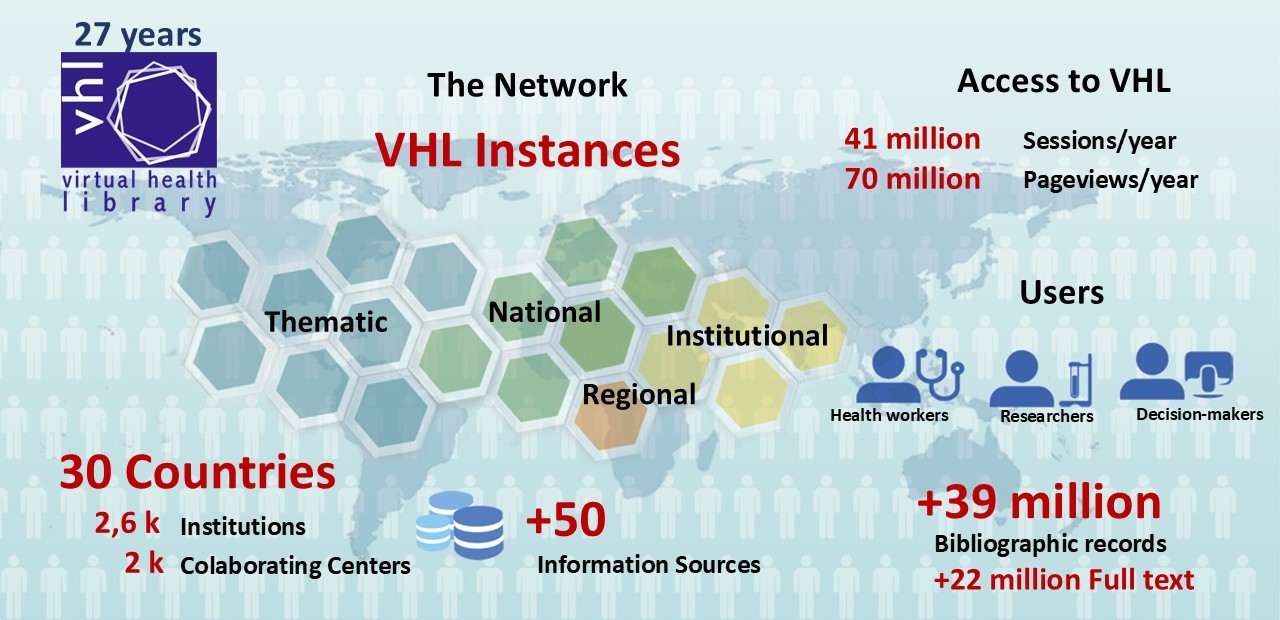In March 2025, the Virtual Health Library (VHL) celebrates its 27th anniversary as a consolidated strategic model for health information management in Latin America and the Caribbean (LA&C). To celebrate the date, BIREME is reaffirming its commitment to the VHL Network by modernizing and integrating national instances into the VHL Regional Portal, promoting more equitable and representative access to scientific and technical information produced in the region.
According to Verônica Abdala Information Products and Services manager at BIREME/PAHO/WHO, experts and managers recognized the need to reformulate and realign the model to the current digital and information context. For Abdala, the VHL is still a powerful and efficient model, but it needs to evolve to maintain its relevance and impact. “The VHL can and must contribute even more to the mission of expanding access to health information in the region. The integration of the national instances into the Regional Portal is an essential step in this process,” she pointed out.
New phase: integration of national instances
The main advance in the next cycle of development of the VHL will be the expansion of the Regional Portal of the VHL and the creation of spaces for the integration of national instances. With this innovation, all countries in the network will have visibility within the platform in an individualized but integrated way. “Our proposal is to build personalized spaces for each country, bringing together in a single environment all the scientific and technical output available in each country in the region,” announced Verônica.
In the current model, some countries operate national instances of the VHL with their own portals, which require local technical infrastructure and continuous updating activities. This dispersion has resulted in operational difficulties for maintenance. With the new approach, the VHL Regional Portal aims to consolidate itself as a single integrated and strengthened repository of the collections of information sources of the national instances, expanding bibliographic control and ensuring greater access and visibility to the scientific and technical output of the Region.
“We are promoting the creation of a large regional collection that includes the scientific and technical production of the countries, allowing each country to have its own space within the Regional Portal, customized to each context”, explained Veronica Abdala.

More inclusion and visibility for countries
The change will make it possible to include and broaden the representation of countries that face technical and operational challenges in implementing their national instances. In the new structure, countries that have significant scientific output, but do not currently have their own VHL portal, will now have a specific consolidated space within the Regional Portal to publicize their scientific output, promoting access, visibility and active participation in the construction of the Regional VHL.
For Joanita Barros, Senior Information Analyst at BIREME, “the integration of countries into the VHL Regional Portal will bring more sustainability to the VHL Network and promote a more equitable model, ensuring the visibility of each nation’s scientific output in a single, integrated and strengthened space. In addition, this new model will allow each country to concentrate its efforts on articulating its network, updating its collection and bibliographic control of its scientific output”.
Next steps
The implementation of the new model is at an early stage and is one of BIREME’s strategic priorities for 2025. A working group is being set up with representatives from different countries to discuss the development of the standards that will serve as the basis for the national pages. Moreover, the thematic instances of the VHL can also be connected to these virtual spaces, ensuring a more cohesive and organized structure.
“The world has changed and the VHL model needs to adapt to this new reality. The essence of networking, decentralized information management and cooperation between countries is still as relevant as ever,” highlighted Verônica Abdala.
With this reformulation, the VHL reinforces its commitment to the democratization of knowledge and the strengthening of the Network, promoting broader, more equitable and sustainable access to health information in Latin America and the Caribbean.